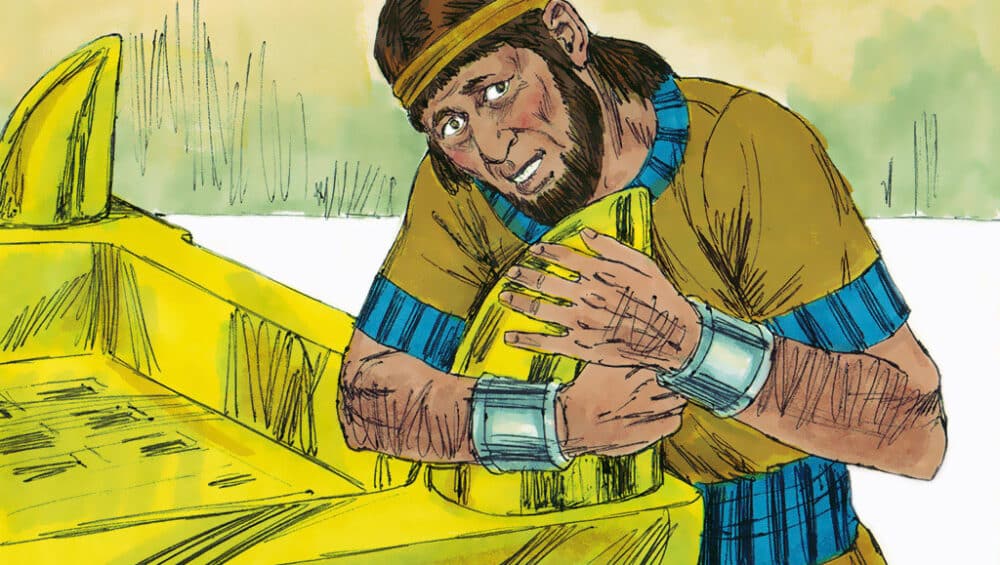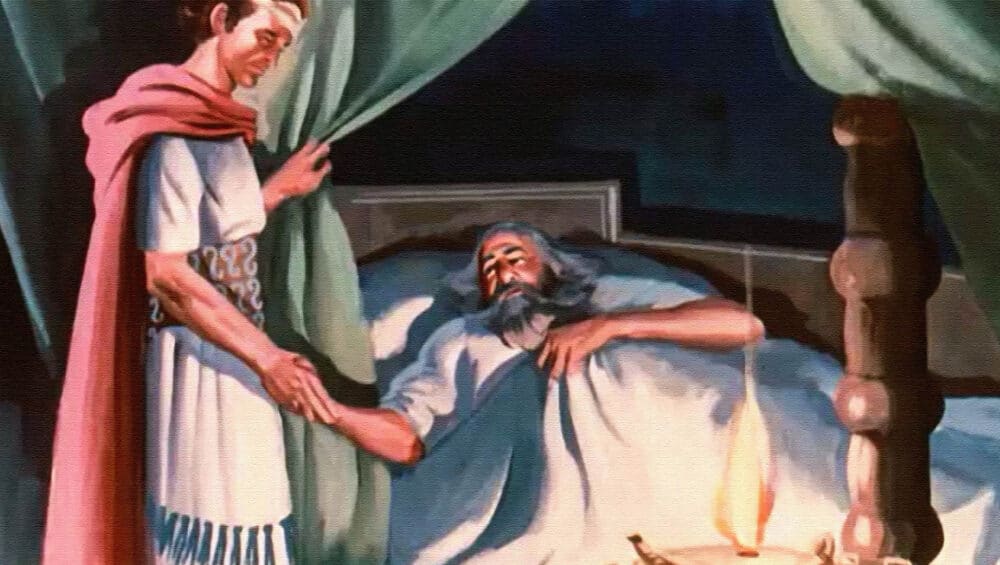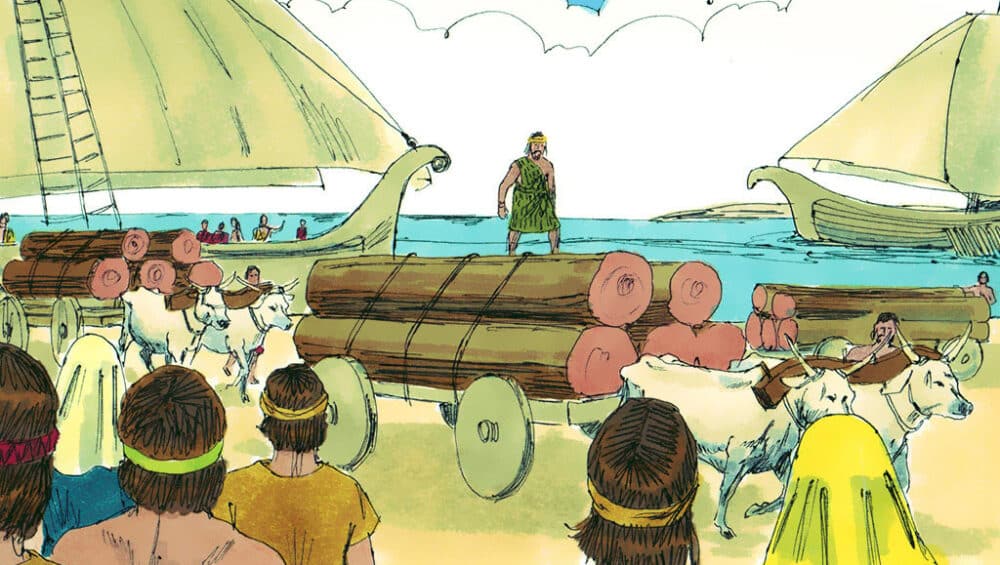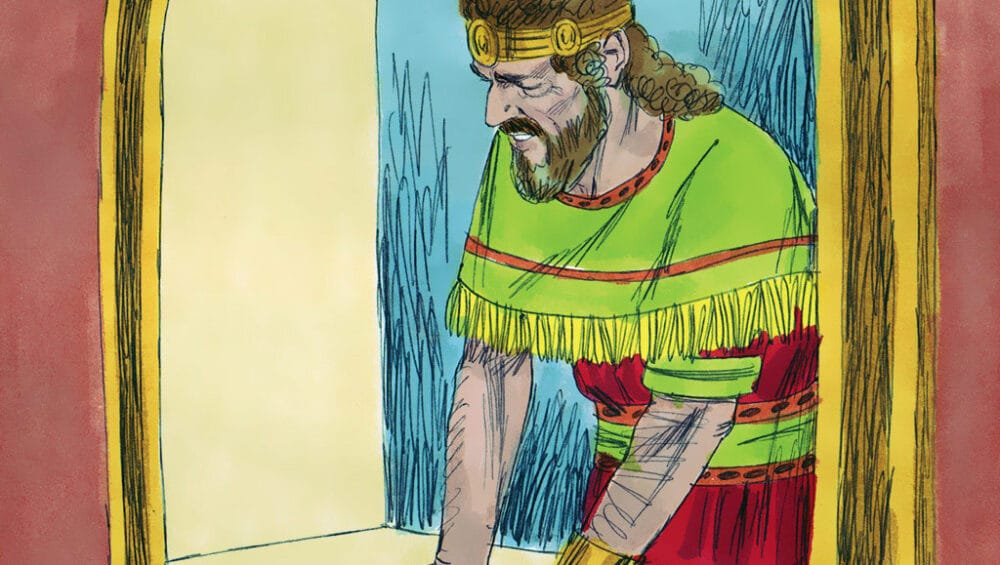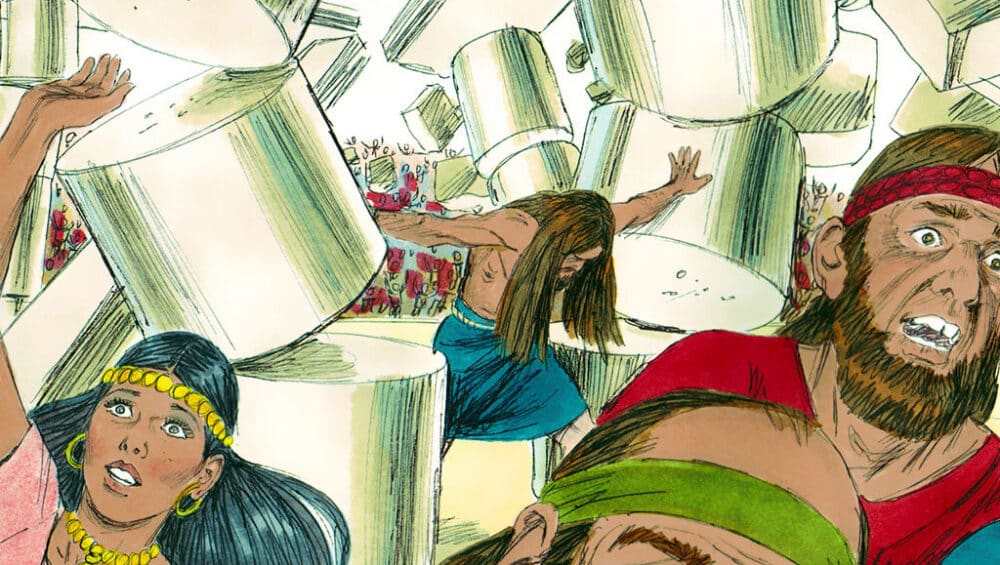Sweet Publishing / FreeBibleimages.org.
Welcome to Livin’ Light’s Bible-In-A-Year challenge of discovering God’s love for us and His purpose for our lives. Here is the format for this great adventure: The daily reading assignment is posted at 5 a.m. After each day’s reading, Leigh An Coplin, the blog host, shares observations and poses questions about difficult passages to Rob Fields, who studied Christian Education at Asbury Seminary and currently teaches Biology in the Orlando area. To start from the beginning, click on 365 Bible Readings and scroll down to Day 1. The reading schedule is taken from The One Year Chronological Bible NLT.
Today’s Reading
— 1 Chronicles 29:1-22
— 1 Kings 1
(970 BC) Click here for a timeline of the entire Bible.
Questions & Observations
Q. (1 Chronicles 29:1-22): As we read this story, should we keep in mind that it is 1 Chronicles, where the author may have glorified the actual happenings to paint a prettier picture of King David’s rule?
A. That is always something to have in mind at this point. We certainly get a “rosy” vision of David, but I would also say that there is not much going on here that is outside of the established character of David: He is willing to make great sacrifices on behalf of his God, and this is just one more instance of it. It is quite clear why David is held up as an OT example for others to follow, even with his obvious shortcomings.
Q. (1 King 1:1-4): What? I guess this is a “give the king his last dying wish?” Whatever the reason is, I’m sure it’s not that important — as I have learned. But, why include it here? From the text, we never see David spending much time with his sons. Maybe this is why they are so at odds. The brothers didn’t have a strong family nucleus with their father or each other?
A. The historian Josephus mentions the “medical” practice of using a healthy person to keep the elderly warm, so it appears that this was an accepted practice in this day. It appears to be part of the process of making David as comfortable as possible in his final days. Verse 6 would seem to indicate that David was quite lax in his discipline of his boys, even where it was quite clear what he desired — for Solomon, not any of his other sons, to be king. David excelled at many things, but it appears that being father of the year was not one of them — and just one more place where the king’s polygamy created unnecessary tension.
Q. (1:5-6): These people seem to be so fickle. If there was such a huge celebration for Solomon to become king, then why is there an opposing side thinking that they can defeat the named king?
A. Both Solomon and his brother are powerful men, so it is most likely that many who joined Adonijah are hedging their bets as to who will be the “true” king. They want to be in the good graces of such a powerful monarch, and one of the best ways was to be on his side and cheering for him, right up until the moment someone else prevails. Fickle is right.
Q. (1:7): Joab sure is a hard one to figure out. He has always stood beside King David, though he definitely wasn’t completely obedient. But, if King David named Solomon the next king, then I would think Joab would support Solomon. On a side note, Joab has to be getting very old too!
A. He is, and this decision to not follow Solomon will be a costly one for him. Technically, Adonijah is probably, by society’s standards, the right choice for king. He was most likely the oldest surviving son, and the logical choice to be king. So it is not surprising that Joab followed him. But as with David, man’s choice for king was not God’s choice.
Q. (1:31): This is a sideline question. People bow before the king. Is this OK with God? I am not sure how God views bowing to anyone except him. Some people around the world greet one another with a bow, showing a sign of respect. This came up once when President Obama bowed to a foreign leader. I was taking a martial arts class with my daughter and we were supposed to bow when you entered the dojo and when we left, I believe, as a sign of respect to the master. I did not like this one bit. I have never met the master who is in another part of the world. I bow my head to God when I pray, but rarely a full-body bow. I definitely don’t feel like bowing to someone that I don’t know, or moreover, someone who isn’t God.
A. I think there is a fine line between bowing in respect for a leader or another person, and “bowing your heart” to an idol. Bowing your heart to anything other than God is obviously not what God desires, but I don’t see a particular problem with showing respect for others, as long as it is not worship.
Q. (1:34): Solomon has already been anointed.
A. Anointing is a public ceremony, so I’m not surprised that Solomon is anointed many times. There wouldn’t have been any CNN covering the ceremony, so the repeated anointing might have had something to do with different people being involved in the process. Part of the reason for this particular ceremony is David’s desire to publicly make it crystal clear who the king is going to be.
Q. (1:50): Adonijah was afraid of Solomon because he had David and the Lord backing him? I would think that Adonijah would die from grabbing the horns of the altar. Maybe he has learned from observing the Lord’s power and will be obedient to Solomon?
A. The horns of the altar are not the same as the Ark, which is what was not to be touched. The horns of the alter were the place where sacrifices were made, and would have been seen as a place of mercy and surrender. This is most likely what Adonijah is attempting to convey: I have sinned against the true king, my brother, and need his forgiveness and mercy.
For further reading: David had a big family! Here’s the list — of sons, anyway, https://www.christianity.com/wiki/people/sons-of-david.html
Shop: Christian shirts get noticed. Check out these conversation starters: https://livinlight.org/shop/
Tomorrow’s reading
— 1 Kings 2:1-9
— 2 Samuel 23:1-7
— 1 Kings 2:10-12
— 1 Chronicles 29:26-30
— Psalms 4-6, 8-9, 11

